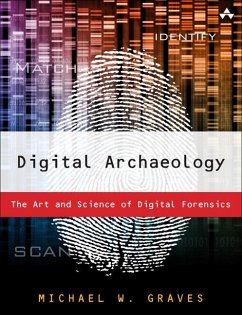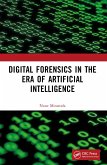The rapid proliferation of cyber crime -- including identity theft, network intrusion, piracy, and distribution of pornography -- is increasing the demand for digital forensics experts in both law enforcement and private investigation. Moreover, nearly 3/4 of conventional crimes now investigated in the US involve some form of computer search. Employment in digital forensics is expected to grow at 22%+ annually through 2018, and far more college students are now pursuing related majors. Unfortunately, most books on digital forensics are of inadequate quality, and many of the better books are quickly becoming outdated. Digital Archaeology solves the problem: expert practitioner Michael Graves has written the field’s most substantial reference.
Graves provides a solid understanding of the legal ramifications and most critical laws affecting digital forensics, including relevant case laws showing how courts have interpreted these laws. He covers each key tool and method investigators can use to reliably uncover hidden information in digital systems, demonstrating applications at work and the actual syntax of command-line utilities. You’ll find up-to-the-minute coverage of current licensing and certification requirements, as well as exclusive coverage of facilities management and a full chapter on the crucial, often-overlooked topic of “first response” to a digital crime scene.
Product Description
The Definitive, Up-to-Date Guide to Digital Forensics
The rapid proliferation of cyber crime is increasing the demand for digital forensics experts in both law enforcement and in the private sector. In Digital Archaeology, expert practitioner Michael Graves has written the most thorough, realistic, and up-to-date guide to the principles and techniques of modern digital forensics.
Graves begins by providing a solid understanding of the legal underpinnings of and critical laws affecting computer forensics, including key principles of evidence and case law. Next, he explains how to systematically and thoroughly investigate computer systems to unearth crimes or other misbehavior, and back it up with evidence that will stand up in court.
Drawing on the analogy of archaeological research, Graves explains each key tool and method investigators use to reliably uncover hidden information in digital systems. His detailed demonstrations often include the actual syntax of command-line utilities. Along the way, he presents exclusive coverage of facilities management, a full chapter on the crucial topic of first response to a digital crime scene, and up-to-the-minute coverage of investigating evidence in the cloud.
Graves concludes by presenting coverage of important professional and business issues associated with building a career in digital forensics, including current licensing and certification requirements.
Topics Covered Include
Acquiring and analyzing data in ways consistent with forensic procedure
Recovering and examining e-mail, Web, and networking activity
Investigating users’ behavior on mobile devices
Overcoming anti-forensics measures that seek to prevent data capture and analysis
Performing comprehensive electronic discovery in connection with lawsuits
Effectively managing cases and documenting the evidence you find
Planning and building your career in digital forensics
Digital Archaeology is a key resource for anyone preparing for a career as a professional investigator; for IT professionals who are sometimes called upon to assist in investigations; and for those seeking an explanation of the processes involved in preparing an effective defense, including how to avoid the legally indefensible destruction of digital evidence.
Features + Benefits
The most definitive and up-to-date practitioner’s guide to digital forensics
Fully covers key topics overlooked in competing books, such as the unique responsibilities of “first responders” to digital crime scenes
Includes a one-of-a-kind chapter on facilities management, and up-to-date coverage of licensing and certification
In Digital Archaeology, expert practitioner Michael Graves has written the most thorough, realistic, and up-to-date guide to the principles and techniques of modern digital forensics. He begins by providing a solid understanding of the legal underpinnings and critical laws affecting computer forensics, including key principles of evidence and case law. Next, he explains how to systematically and thoroughly investigate computer systems to unearth crimes or other misbehavior, and back it up with evidence that will stand up in court. Drawing on the analogy of archaeological research, Graves explains each key tool and method investigators use to reliably uncover hidden information in digital systems. Graves concludes by presenting coverage of important professional and business issues associated with building a career in digital forensics, including current licensing and certification requirements.
Hinweis: Dieser Artikel kann nur an eine deutsche Lieferadresse ausgeliefert werden.
Graves provides a solid understanding of the legal ramifications and most critical laws affecting digital forensics, including relevant case laws showing how courts have interpreted these laws. He covers each key tool and method investigators can use to reliably uncover hidden information in digital systems, demonstrating applications at work and the actual syntax of command-line utilities. You’ll find up-to-the-minute coverage of current licensing and certification requirements, as well as exclusive coverage of facilities management and a full chapter on the crucial, often-overlooked topic of “first response” to a digital crime scene.
Product Description
The Definitive, Up-to-Date Guide to Digital Forensics
The rapid proliferation of cyber crime is increasing the demand for digital forensics experts in both law enforcement and in the private sector. In Digital Archaeology, expert practitioner Michael Graves has written the most thorough, realistic, and up-to-date guide to the principles and techniques of modern digital forensics.
Graves begins by providing a solid understanding of the legal underpinnings of and critical laws affecting computer forensics, including key principles of evidence and case law. Next, he explains how to systematically and thoroughly investigate computer systems to unearth crimes or other misbehavior, and back it up with evidence that will stand up in court.
Drawing on the analogy of archaeological research, Graves explains each key tool and method investigators use to reliably uncover hidden information in digital systems. His detailed demonstrations often include the actual syntax of command-line utilities. Along the way, he presents exclusive coverage of facilities management, a full chapter on the crucial topic of first response to a digital crime scene, and up-to-the-minute coverage of investigating evidence in the cloud.
Graves concludes by presenting coverage of important professional and business issues associated with building a career in digital forensics, including current licensing and certification requirements.
Topics Covered Include
Acquiring and analyzing data in ways consistent with forensic procedure
Recovering and examining e-mail, Web, and networking activity
Investigating users’ behavior on mobile devices
Overcoming anti-forensics measures that seek to prevent data capture and analysis
Performing comprehensive electronic discovery in connection with lawsuits
Effectively managing cases and documenting the evidence you find
Planning and building your career in digital forensics
Digital Archaeology is a key resource for anyone preparing for a career as a professional investigator; for IT professionals who are sometimes called upon to assist in investigations; and for those seeking an explanation of the processes involved in preparing an effective defense, including how to avoid the legally indefensible destruction of digital evidence.
Features + Benefits
The most definitive and up-to-date practitioner’s guide to digital forensics
Fully covers key topics overlooked in competing books, such as the unique responsibilities of “first responders” to digital crime scenes
Includes a one-of-a-kind chapter on facilities management, and up-to-date coverage of licensing and certification
In Digital Archaeology, expert practitioner Michael Graves has written the most thorough, realistic, and up-to-date guide to the principles and techniques of modern digital forensics. He begins by providing a solid understanding of the legal underpinnings and critical laws affecting computer forensics, including key principles of evidence and case law. Next, he explains how to systematically and thoroughly investigate computer systems to unearth crimes or other misbehavior, and back it up with evidence that will stand up in court. Drawing on the analogy of archaeological research, Graves explains each key tool and method investigators use to reliably uncover hidden information in digital systems. Graves concludes by presenting coverage of important professional and business issues associated with building a career in digital forensics, including current licensing and certification requirements.
Hinweis: Dieser Artikel kann nur an eine deutsche Lieferadresse ausgeliefert werden.

